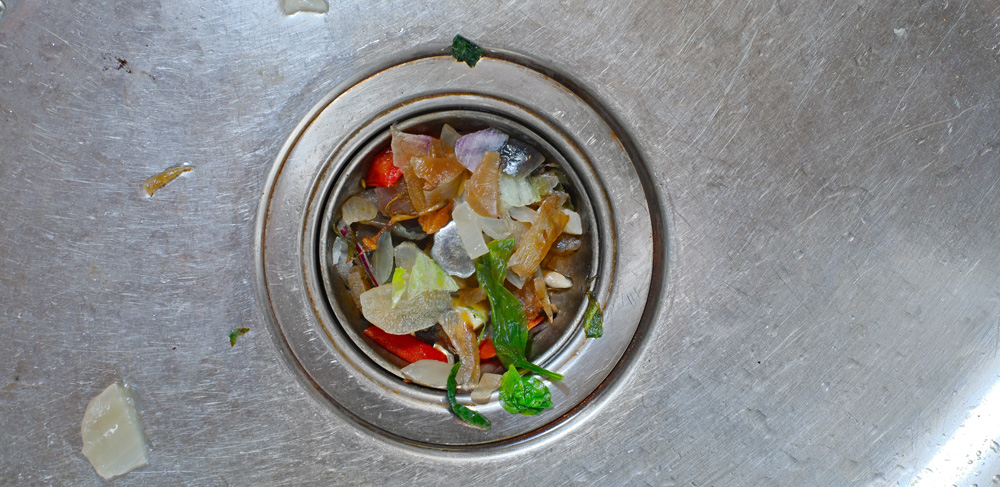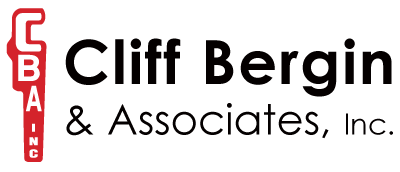12 Aug The Expert’s Guide to Stubborn Clogs
Tough drain clogs are more than an inconvenience—they can prelude bigger problems that require professional attention. That’s why the plumbing experts at Cliff Bergin & Associates are happy to weigh in with insights and tips to help keep all the drains in your home flowing freely.

Start With Clog Prevention
There are some simple things you can do to prevent clogs in the first place and preserve your plumbing system:
- Toss scraps, clippings, and hairs. There are a lot of objects passing through your plumbing system every day that shouldn’t be there. Kitchen waste—like leftover food scraps, coffee grounds, and eggs shells—should never be washed down a drain. Bathroom plumbing tips include keeping hair, nail clippings, and excess toothpaste from going down the drain, and never flushing hygiene products. All these items should be composted or thrown in the trash instead.
Tip: Lift drain stopper from your bathroom sink and shower drain weekly—remove any hair and debris, rinse, and reinsert. Also clean your garbage disposal monthly with a few cups of ice and some table salt to cut grease and grime. - Keep grease out of your pipes. Food isn’t the only culprit—many soaps are animal- or vegetable-fat based and contribute to grease clogs. Over time, greasy buildup in a pipe stops water from passing through and leads to a backup and overflow. The result is a smelly slurry that’s among the most challenging drain issues to deal with. Persistent grease clogs are often due to an improper angle in your pipes—schedule an appointment with a plumber as soon as possible.
Tip: The best way to prevent grease from accumulating in your pipes is to limit how much enters your plumbing system and to flush drains frequently with a mix of hot water and dish soap.
- Toss scraps, clippings, and hairs. There are a lot of objects passing through your plumbing system every day that shouldn’t be there. Kitchen waste—like leftover food scraps, coffee grounds, and eggs shells—should never be washed down a drain. Bathroom plumbing tips include keeping hair, nail clippings, and excess toothpaste from going down the drain, and never flushing hygiene products. All these items should be composted or thrown in the trash instead.
Be Prepared for Drain Clogs With a Few Plumbing Essentials
You don’t need to invest in costly items to effectively handle most clogged drains and toilets. Your home plumbing essentials should include:
- Drain covers
- A stout-handled plunger with a large bell
- An adjustable wrench
- Rubber gloves
- A bucket that fits under your sinks
Tip: Before plunging a tub or sink drain, cover the overflow hole or close the drain on a double-sided sink. This creates a vacuum that delivers more pressure directly to the clog.
Don’t Resort to Chemical Drain Openers
There are lots of reasons for having little or no water. Start by checking these top four trouble areas:
Plumbing professionals will tell you to steer clear of chemical drain cleaners. The harsh ingredients in these products can be damaging your pipes, your skin, and other surfaces. Some products react with aluminum and release unhealthy gasses. Others can solidify inside the pipe, or worse yet, mix with other household cleaners and cause the pipe to burst.
Tip: A safer option for unclogging drains is flushing with boiling water. If that doesn’t work, try a mixture of equal parts baking soda and vinegar, let sit until it stops bubbling, then follow with more boiling water.
Need Advice Beyond Plumbing?
Check out our technician tips to help you troubleshoot plumbing, water conditioning, or HVAC issues at home. If the problem demands professional assistance, contact us any time. As a Carrier® Factory Authorized Dealer, we maintain the highest standards for every service we offer, and are available to provide 24-hour service to homes throughout Southeastern Wisconsin.



